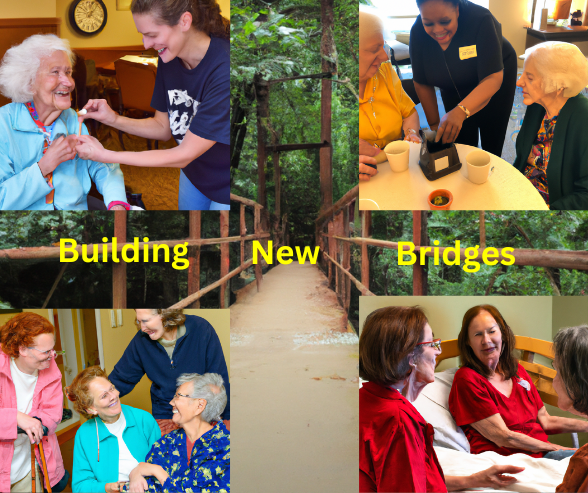In our society…
there is an increasing recognition of the importance of personalized support in long-term care communities. These communities cater to older adults and vulnerable individuals who require specialized care and attention. While professional care staff play a crucial role in meeting their needs, the power of one “Companion” volunteer can make a remarkable difference by providing individualized activities that are meaningful to each person. In this blog, we will explore the significance of these volunteers in long-term care communities, how they can improve the quality of life for residents through personalized engagement, and the value they bring to the professional care staff.
Long-term care communities…
aim to create an environment that feels like home for their residents. However, due to various reasons such as time constraints and limited staff resources, it can be challenging for care staff to provide personalized attention and activities tailored to each individual’s interests and preferences. This is where “Companion” volunteers step in.
Let’s imagine…
Susan, who is passionate about connecting with others and has a genuine interest in supporting older adults. Susan becomes a “Companion” volunteer at a local long-term care community, where she takes the time to learn about each resident’s history, interests, and life experiences. Armed with this knowledge, Susan creates individualized activities that resonate with each person, tapping into their unique passions and bringing them joy.
For example, Susan discovers that Mr. Johnson was an avid gardener in his younger years. She arranges for a small indoor garden in his room, providing him with pots, soil, and seeds. Together, they spend time nurturing the plants, discussing gardening techniques, and sharing stories of their own gardening experiences. This personalized activity not only brings a sense of purpose and fulfillment to Mr. Johnson but also allows Susan to form a deeper connection with him based on shared interests.
Similarly…
Susan learns that Mrs. Thompson used to be an art teacher. To tap into her passion for art, Susan arranges for personalized painting sessions where Mrs. Thompson can express her creativity and engage in a beloved hobby. These activities not only provide a creative outlet but also evoke memories and promote cognitive stimulation. Susan’s commitment to personalized engagement ensures that Mrs. Thompson feels valued and supported, enhancing her overall well-being.
Focus on personalized activities…
By focusing on personalized activities, “Companion” volunteers have the power to create meaningful experiences and connections with residents. They can engage in one-on-one conversations, reminiscing about the past, sharing stories, and offering companionship. These interactions foster a sense of belonging, reduce feelings of loneliness, and improve the overall quality of life for residents.
Moreover…
“Companion” volunteers can provide much-needed respite for professional care staff. By taking the time to engage with residents on a personal level, volunteers allow care staff to focus on essential medical and administrative tasks. This collaboration between volunteers and staff creates a cohesive caregiving team that prioritizes the well-being of residents.
Consider this…
James, a “Companion” volunteer in a long-term care community. James invests time in getting to know each resident’s preferences and hobbies. For Mrs. Roberts, who had a lifelong passion for literature, James arranges for weekly book club meetings in which they discuss novels and share their favorite literary works. By tailoring activities to each individual, James not only brings joy and intellectual stimulation but also creates a sense of community and belonging within the long-term care community.
The power of one…
“Companion” volunteer lies in their ability to provide personalized support that enriches the lives of residents. By connecting with each individual on a deeper level, these volunteers can create activities and experiences that resonate with their interests, passions, and life stories. The power of one “Companion” volunteer in a long-term care community is immeasurable. By providing personalized support and individualized activities, the “Companion” volunteer enhances the quality of life for residents, promotes well-being, and fosters a sense of belonging. Their dedication and commitment not only benefit the residents but also provide much-needed support to the professional care staff.
Are you ready to be the one…
who creates personalized experiences that bring joy and meaning to residents in long-term care communities? Consider becoming a “Companion” volunteer and join the efforts to provide tailored support to those who deserve it the most. Together, we can make a profound impact and create a community of care, connection, and personalized engagement.
To embark on your journey…
as an effective “Companion” volunteer and make a meaningful impact in long-term care communities, I encourage you to take the next step. Visit the Let’s Get Started page on the National Association of Long-Term Care Volunteers (NALTCV) website and enroll in the training course “Volunteering in Long-Term Care.”
This comprehensive course will provide you with the necessary foundation to navigate the unique challenges and opportunities of volunteering in long-term care settings. By equipping yourself with the knowledge and skills offered in this course, you’ll be well-prepared to make a difference as a “Companion” volunteer and positively impact the lives of residents.
Take the initiative today…
join the growing community of compassionate individuals dedicated to enhancing the quality of life in long-term care communities.




